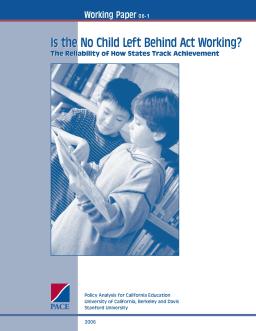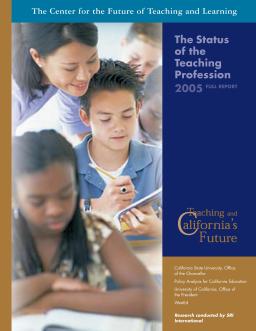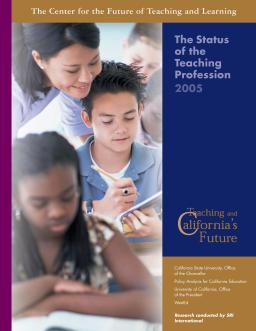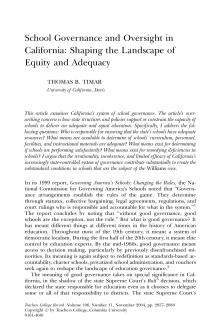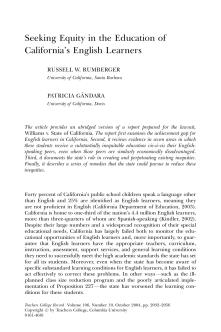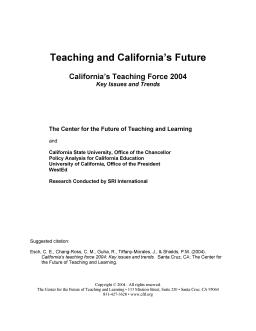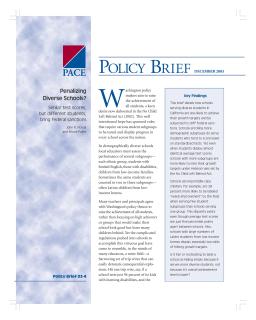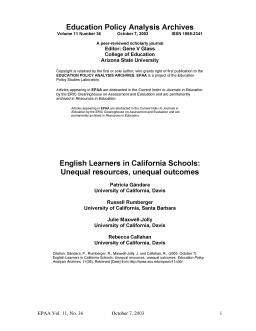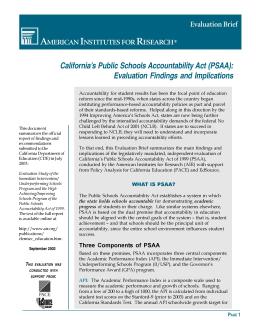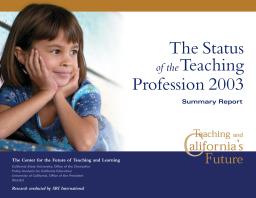The Reliability of How States Track Achievement
Published
Summary
This paper analyzes the impact of the No Child Left Behind Act on the state's funding system and notes that it exacerbated inequities by penalizing schools that did not meet annual progress targets without providing sufficient resources to help them improve. The authors suggest that a more equitable funding system based on student needs and costs would better serve all students, including those who are struggling to meet academic standards.
Full Report
Published
Summary
The Teaching and California's Future initiative provides policymakers with data on the teacher workforce and labor market. The initiative's annual report details teacher development policies and their impact on teacher quality and distribution. The goal is to help policymakers make informed decisions about strengthening the state's teacher workforce.
Published
Summary
The quality of teaching and the need to expand California's ranks of excellent teachers demand urgent public discussion. We must attract the best and brightest to teaching, prepare them effectively, and support and retain them. Solutions require bipartisan leadership, not spin. This report presents the latest research and projections, highlighting that while some numbers are improving, we're likely to face severe shortages again soon and the pipeline for recruiting, preparing, and training teachers has substantial problems.
Shaping the Landscape of Equity and Adequacy
Published
Summary
This report focuses on California's school governance system and how it affects schools' ability to provide an adequate and equal education. The author examines who is responsible for ensuring adequate resources, how to assess adequacy, how to determine school performance, and how to address deficiencies. The report argues that California's state-controlled governance system is irrational, incoherent, and limited in efficacy, contributing to substandard school conditions, as seen in the Williams v. California case.
Published
Summary
This article presents a summary of a report prepared for the Williams v. State of California lawsuit, highlighting the achievement gap for English learners in California and seven areas where they receive an inequitable education compared to their English-speaking peers. It also documents the state's role in perpetuating these inequities and proposes remedies to reduce them.
California’s Teaching Force, 2004—Key Issues and Trends
Published
Summary
California's aging teacher workforce will lead to a significant demand for teachers, with shortages particularly in special education and secondary education. The number of underprepared teachers in low-performing schools serving minority, poor, and ELL students is disproportionate. Budget cuts have reduced funding for recruitment and professional development programs, and California's induction system needs refinement. Curriculum-based professional development programs have mainly targeted elementary school teachers, neglecting the training needs of secondary teachers.
Similar Test Scores, but Different Students, Bring Federal Sanctions
Published
Summary
California schools with more demographic subgroups are less likely to meet their growth targets and face federal sanctions, even when students have similar average test scores. Schools with many low-income Latino students are particularly unlikely to hit growth targets. Is it fair to label diverse schools as failing when their overall achievement level is not necessarily lower?
Unequal Resources, Unequal Outcomes
Published
Summary
This article discusses the inequitable education provided to English language learners in California, arguing that there are seven areas where these students receive an inferior education compared to English speakers. That includes having less qualified teachers, inferior curriculum, and being assessed with invalid instruments. The article provides suggestions for addressing these issues.
Evaluation Findings and Implications
Published
Summary
This report evaluates California's Public Schools Accountability Act of 1999, which aimed to hold schools accountable for student results. The brief summarizes the main findings and implications of the legislatively mandated, independent evaluation of the Act, with the aim of helping states understand and learn from preceding accountability efforts.
Summary Report
Published
Summary
This report argues that the state of California needs to prioritize better education for all children with a sustained long-term investment of resources and leadership. Despite political upheaval and fiscal problems, there is a consensus for better education. The authors suggest that the issue requires a response as intense and sustained as the state's response to natural disasters, and calls for a system of teacher development to ensure all teachers have the necessary knowledge and skills to meet academic standards.
New Education Policy Center's Goal Is to Be Information Resource for Policymakers and Michigan Educators
Published
Summary
Michigan State University's College of Education has established the nonpartisan Education Policy Center to provide lawmakers and educational leaders with accurate, research-based information to improve the state's educational system. With the support of the university's resources, the center aims to play an important role in deepening the policy debate and bringing about improvements in the system. The center was established due to a lack of systematic communication between researchers and policymakers in Michigan.
